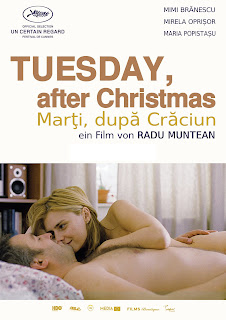Marți, după Crăciun/Tuesday, After Christmas (2010)
"Tuesday, After Christmas" is centered on Paul, a middle-aged man with a wife and child having an affair with a younger woman, who's also his daughter's dentist. The movie plays out over a few days leading up to Christmas. By then, he's confessed the affair to his wife, who throws him out. The movie concludes with them meeting up at Paul's parents' house for Christmas, in order to conceal the breakup from their child until after the holidays. She informs him she's more or less cutting him out of their daughter's life, and he just agrees to proceed according to her wishes.
And for all intents and purposes, that's the plot. There's certainly more that happens, but it's to build tension and tone, rather than impact the story. This is really more interested in exploring emotion than anything else.
Towards the end of the movie, as Paul's moved into his girlfriend's apartment, a friend helping him references the New Year and how Paul's certainly undergoing the associated symbolic change. The theme, as I interpret it, is playing with the idea the change feels completely hollow. We see no relief on Paul's face; he acts more like it's all something happening to him, rather than something he instigated.
This might be a metaphor for Romania's shift to capitalism. Wikipedia informs me the genre often includes themes connected to the shift, and it's not too hard to view the characters through that lens, with Paul's soon-to-be ex-wife standing in as communism, his alluring girlfriend being his future, and the emptiness of the change being a critique for how that's all going. It certainly works with the way the characters are presented visually, though - again - take this interpretation with a grain of salt. I'm not part of the culture this came out of and could easily be reading too much or too little into what's on the surface.
Stylistically, the movie is shot realistically. The point here is to pull you in and almost force you to experience the discomfort its characters are going through. And, by any technical appraisal, it's extremely successful. The movie is grounded and effective at what it's setting out to do. Whether that's of interest to audiences watching in translation is another question.
For what it's worth, I found it interesting, though I've got a bit of an advantage here. I watch these in part to see how they incorporate the holidays, so anything that differs from the half-dozen or so things US movies do is going to hold my attention.
In this case, the holidays sort of fade into the background. If this were an American movie, I'd expect to see them used to contrast the emotion the characters are experiencing, but this isn't really the case. Decorations are present, but they don't feel vibrant or exciting: if anything, they're drab and underwhelming.
Same goes for the gifts. Near the beginning, we see Paul and his wife shopping for a snowboard for their daughter, only to be forced to choose between one with the wrong style and one that's the wrong size. At the end, she also receives a Barbie boat that's oversized, plastic, and garish. Whether you buy into the theory the movie's a metaphor or not, this certainly leaves you with the impression that capitalism sets more expectations than it delivers on, with Christmas being a prime example.
This is absolutely a good movie, but your enjoyment is going to depend on your interest in foreign films and tolerance for stories with slow paces and not a lot of resolution. If you're here for the artistry, I think you'll find a great deal to appreciate, but don't expect this to go big in any meaning of the term.
One last thing, in the off chance anyone cares: this includes a couple shots of frontal nudity, both male and female. I can't imagine anyone who'd be at all interested in watching a Romanian New Wave Christmas drama would be scandalized by a penis, but - in the off chance you're still hung up on that sort of thing - don't say I didn't warn you.


Comments
Post a Comment